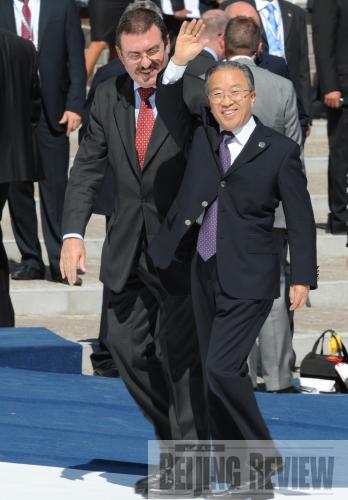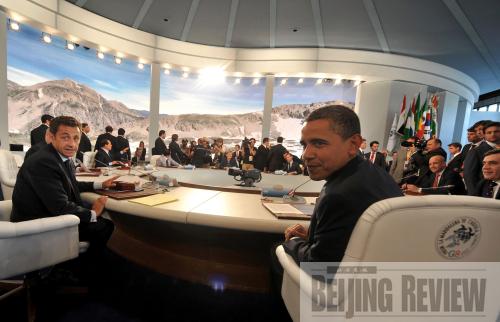|
 |
|
HELLO: Chinese State Councilor Dai Bingguo waves as he arrives at the meeting venue for the dialogue between leaders of the G8 and developing countries in L'Aquila, Italy, on July 9 (HUANG JINGWEN) |
Changes are coming to the Group of Eight (G8). For decades, major industrialized countries have called the shots in international institutions. But now they are becoming less influential and increasingly count on developing countries to cope with pressing problems ranging from the global financial crisis to climate change. This year's G8 summit in L'Aquila, Italy, from July 8 to 10 highlighted this burgeoning trend.
Italy, which currently holds the G8 presidency, invited a record number of countries to the summit, including emerging economies and African countries. The attending nations represented some 90 percent of the world economy.
"The G8 has seen its influence decline in the past couple of years," said Jin Canrong, Deputy Dean of the School of International Studies at Renmin University of China. "It is trying to curb this decline by involving more countries through mechanisms such as the G8+5."
 |
|
TOUGH TALKS: U.S. President Barack Obama and French President Nicolas Sarkozy attend the G8 summit in L'Aquila, Italy, on July 8 (XINHUA) | The G8+5 consists of the G8 nations, Canada, France, Germany, Italy, Japan, Russia, Britain and the United States, and the five leading emerging economies—Brazil, China, India, Mexico and South Africa. This year, Egypt joined the G5 in the dialogue between leaders of the G8 and developing countries on July 9.
Although it failed to meet high expectations from the recession-ridden world, the G8 summit sent a clear signal that developing countries, especially emerging economies, are poised to play a bigger role in global governance, said Chinese international studies experts.
Encouraging results
As the first G8 summit since the outbreak of the global financial crisis, the L'Aquila summit was expected to put forth tangible measures in economic and financial fields, Jin said. People were disappointed that it did not, he added.
|
